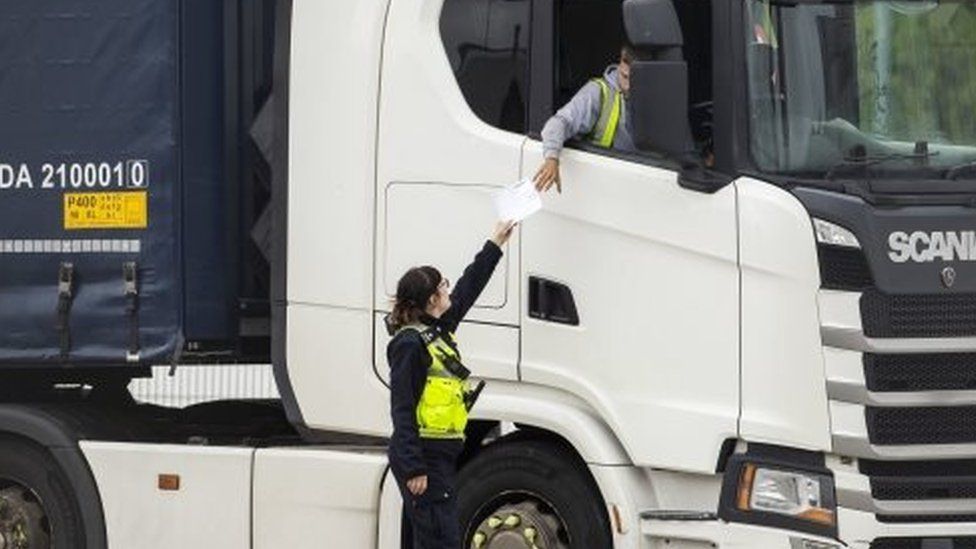Brexit: NI Protocol 'helps lessen impact on NI economy'
- Published
- comments

Northern Ireland will be the UK regional economy least impacted by Brexit, partially due to the NI Protocol, new analysis has suggested.
Researchers at the London School of Economics and the Resolution Foundation used modelling to estimate the longer-run impacts of Brexit.
The model assesses the impact of post-Brexit trade barriers with the EU.
It estimates the UK economy will be 1.3% smaller compared to no Brexit, with a 0.7% hit to the NI economy.
However even without the protocol the impact on the Northern Ireland economy is smaller than the UK average.
The protocol keeps Northern Ireland inside the EU's single market for goods giving Northern Ireland manufacturers better access to the EU than companies in other parts of the UK.
It also means there are checks and controls on goods entering Northern Ireland from Great Britain, leading to added cost and complexity for importing businesses.
Analysis: Assumptions are key
Economic models are tools which can help us to understand an economy and estimate the impact of different policies.
They generally consist of a set of mathematical equations that describe a theory of economic behaviour.
With any piece of economic modelling, the underpinning assumptions are key.
So it's important to note that this new work is based on the current implementation of the protocol.
This is a heavily mitigated version of the protocol compared to the one which was originally negotiated.
So if the protocol was implemented in full it may produce a less favourable economic impact.
The economic modelling attempts to assess the impact of those new GB-NI controls as currently being implemented.
It finds that the hit to regional output ranges from almost 2% in the north east of England to 0.7% in Northern Ireland.
It concludes that Northern Ireland "looks set to fare less badly than most, driven by the Northern Ireland Protocol (NIP) with total output declining by just 0.7% relative to the baseline".
"When the NIP is removed, Northern Ireland falls to the fourth least affected, with an output shock of 1.1% which is still better than the UK average of 1.3%.
"For all other regions, the NIP has a very small positive effect, reducing the fall in output by approximately 0.01 percentage points."
This is the second piece of academic modelling that attempts to quantify the impact of Brexit and the protocol on the Northern Ireland economy.
The earlier study by the Fraser of Allander Institute (FAI) at Strathclyde University assessed that Northern Ireland's economy would take a bigger hit than that suggested by the LSE/Resolution Foundation.
It suggested that the hit would range from 1.5% to 3.5%, with a central scenario of 2.6%, compared to no Brexit.
The FAI work looked only at Northern Ireland and did not attempt to compare the impacts on other UK regions.
A previous FAI study suggested the least damaging Brexit outcome for Northern Ireland would have been a soft Brexit for all of the UK.
That 2019 study suggested a "Norway-style" arrangement for the whole of the UK would have would cost Northern Ireland's economy an estimated 1.1% of GDP compared with no Brexit.
The Office of Budget Responsibility (OBR) has estimated that Brexit will reduce the UK's potential GDP by about 4% in the long term compared to no Brexit.
What is the Northern Ireland Protocol?
The trade deal governs how goods enter Northern Ireland from the rest of the UK and was agreed by the UK government and the European Union following the Brexit vote in 2019.
It was designed to prevent a hard border on the island of Ireland when the UK left the European Union.
The protocol led to the creation of new goods checks at Northern Ireland sea ports on some products from Great Britain, effectively creating a new trade border in the Irish Sea.
Unionist parties, including the Democratic Unionist Party (DUP), argue that this has led to extra costs and unnecessary delays, as well as undermining the union between Northern Ireland and the rest of the UK.
Read more: A simple guide to the Brexit border problem
Related Topics
- Published19 June 2022
- Published2 February